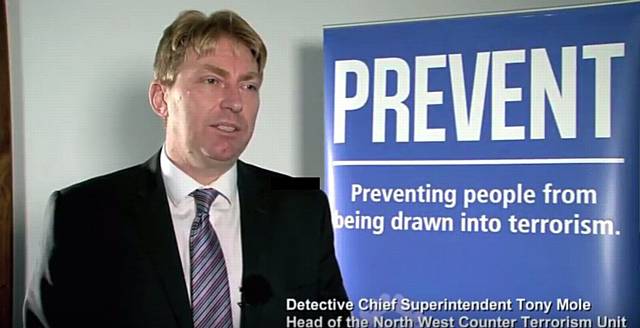Counter Terrorism Police and NHS initiative reducing risk by improving mental health provision
Date published: 14 October 2016

Dave Wells, the North West Counter Terrorism Unit's regional Prevent Coordinator
Scroll down for Video
A pilot scheme that creates mental health hubs in counter terrorism units is helping vulnerable people access vital services and reducing risk to the public.
Medical practitioners have been working alongside Prevent officers as part of a year-long trial in three areas – the North West, the West Midlands and London - offering more support for those thought to be at risk of radicalisation.
The new teams of psychologists, psychiatrists and mental health nurses are assessing people who have been referred through the Prevent programme, helping those in need to access mental health services. There is already one mental health practitioner working in the North West Counter Terrorism Unit in Manchester, with plans for an additional Mental Health Nurse and a psychiatrist to join the area in the future.
The initiative – which began in July 2016 and will run until March 2017 - was launched following a needs assessment that was carried out by clinical staff at Birmingham and Solihull Mental Health NHS Foundation Trust last year.
They looked at a sample of individuals referred for being at risk of radicalisation, and found up to half the cases exhibited a broad range of mental health and psychological difficulties. This applied across different ideologies, including Islamist and far right extremism.
As well as providing a holistic approach to the mental health of people going through the programme, the hubs also incorporate best practice from other mental health services such as Street Triage, Liaison and Diversion Services and FTAC (the Fixated Threat assessment Centre) where the NHS and Police work in close partnership to identify and support vulnerable individuals with mental health difficulties.
The pilot has already seen many vital support and signposting to services given to many people in the programme.
Dave Wells, the NWCTU’s regional Prevent Coordinator said: “The Mental Health Pilot scheme brings together a small team of counter terrorism and NHS mental health professionals to ensure that, where mental health is a factor, we can be satisfied that an individual gets access to the right treatment.
“It was launched following empirical research, which suggested that undiagnosed or unmet mental health needs were a factor in a minority of individuals that came to the Police’s attention as being vulnerable to violent extremism.
“We must not forget that the threat to the UK from terrorism remains at severe, and that this threat constantly evolves from large scale, well-planned attacks directed by terrorist organisations to singular opportunist attacks by lone actors, some of whom had mental health issues.
“The new teams in London, Birmingham and here in Manchester offer the UK additional resilience in the fight against terrorism.
“The pilot expands the multi-disciplinary workforce within the North West Counter Terrorism Unit, all of whom work very hard to ensure that individuals and communities across the North West are kept safe from terrorism.
“It also builds on the fantastic relationship we have with the NHS, who clearly understand the need to safeguard vulnerable people and ensure that the right support is available.”
Funding for the pilots and the evaluation is provided by national counter terrorism police, the NHS and the Home Office.
Paul Elms, the NHS’s Prevent Coordinator for the North West said: “NHS England support the creation of the Mental Health Pilot Schemes, as they are an important development in our on-going effort to prevent vulnerable people from being radicalised and potentially drawn into terrorism.
“They bring together police and NHS nurses to ensure that appropriate care pathways are established and that people receive targeted support as soon as possible.”
A pilot scheme that creates mental health hubs in counter terrorism units is helping vulnerable people access vital services and reducing risk to the public
©GMP
Do you have a story for us?
Let us know by emailing news@rochdaleonline.co.uk
All contact will be treated in confidence.
Most Viewed News Stories
To contact the Rochdale Online news desk, email news@rochdaleonline.co.uk or visit our news submission page.
To get the latest news on your desktop or mobile, follow Rochdale Online on Twitter and Facebook.

